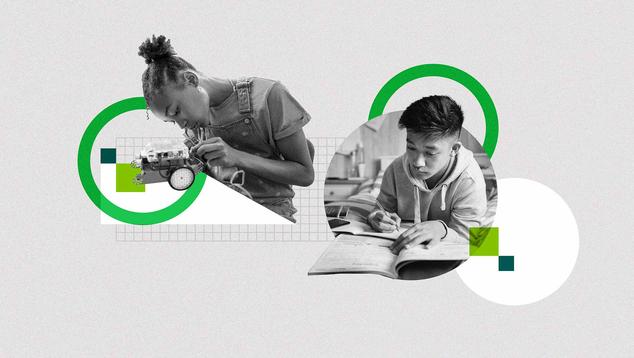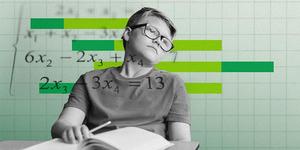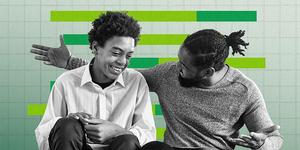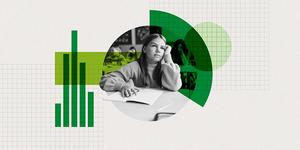Story Highlights
- Students need more choice and control to stay engaged in learning.
- Learning real-life skills boosts student post-high school readiness.
WASHINGTON, D.C. — The transition from school year to summer offers educators a moment to reflect on how to improve students’ learning experiences. A recent study by Opportunity Education Foundation and Gallup offers insight into how students in grades 5-12 are learning inside and outside of the classroom. Based on a recent survey of Iowa students, the findings suggest schools should rethink how to design learning to better support student growth, engagement in learning and readiness for the future.
Learning Experiences in the Classroom
Active learning — through discussion, collaboration, hands-on problem-solving and reflection — improves critical thinking and academic outcomes1, 2. Students who regularly participate in active learning methods in the classroom are also more likely to show agency. But for many students, these types of learning experiences are rare.
Student agency — the ability to make choices about one’s learning and take an active role in shaping educational experiences — is essential for student motivation and engagement in learning3,4.
Yet, many students have few chances to exercise agency. Fewer than half (42%) of Iowa students surveyed “agree” or “strongly agree” they are able to learn at their own speed in class, and 28% report that they get to make choices about what they learn in class.
While most Iowa students are participating in school, many are not deeply engaged in learning. More than three-quarters of students (76%) agree or strongly agree that they participate in class activities, but fewer than half (47%) say they enjoy their classes. Additionally, one in three (34%) say they are “always” bored, suggesting that participation does not always translate into meaningful engagement in learning. These findings mirror a recent national study by the Walton Family Foundation and Gallup that found that fewer than two in 10 Gen Z students strongly agree that what they are learning in class feels important, interesting, challenging or aligned with their natural talents.
These findings highlight the need for more active learning and student agency in the classroom.
Learning Experiences Beyond the Classroom
Learning also happens outside the classroom, and students actively pursue those opportunities. Three in four Iowa students (74%) report excitement when learning something new through extracurricular activities. They also put considerable effort into these activities: 55% say they invest a lot of effort into their out-of-school activities, compared with 45% who say the same about their classroom tasks.
That effort pays off: 74% of students say they teach themselves new skills through extracurricular activities, and many choose to join after-school activities on their own. More than three in four (76%) students disagree or strongly disagree that they participate in extracurricular activities because their parents or guardians want them to.
These findings indicate that students are enthusiastic about learning outside the classroom and gaining valuable skills in the process. Offering students greater agency and explicit opportunities to build new skills could similarly boost engagement within classroom settings.
Preparing for Life After Graduation
Thinking about life after high school can feel overwhelming, but preparing for it can help. For example, participation in active learning activities is associated with student reports of greater preparedness for life after graduation.
High school students who say they are teaching themselves helpful life skills outside of school are 33% more likely to feel prepared for life after high school. However, those who report learning life skills in school are 53% more likely to feel prepared, suggesting that school-based learning still plays the strongest role in life preparedness, even with high engagement outside the classroom. Yet many students do not report having these experiences in school. Only 49% of high school students agree or strongly agree they are teaching themselves life skills in school, pointing to a need for more opportunities that promote student agency in what and how they learn.
Students clearly value real-life skills, but many do not have enough opportunities to build them in school. Bringing more applied skills into classroom instruction can strengthen students’ confidence, sense of readiness and future success.
The Road Ahead: Rethinking Students’ Learning Experiences
As educators reflect on the past school year and plan for the next, one message is clear: Students want to learn, but how they experience learning makes a difference.
This starts with giving students more voice and choice in what and how they learn. Many teachers already work to build student agency in their classrooms, but lasting change depends on schools — and the larger systems that support them — providing the resources and professional development needed to carry out and maintain new teaching methods.
When students take part in relevant, active learning, they are more likely to connect with the material and take ownership of their progress. These experiences strengthen students’ confidence in their ability to succeed beyond high school.
Students who have meaningful educational opportunities don’t just participate — they take the lead in their own learning. That kind of engagement builds both student learning and self-efficacy, setting them up to thrive.
Read the Learning in Focus: Examining Iowa Students' Engagement in Grades Five Through 12 report.
Stay up to date with the latest insights by following @Gallup on X and on Instagram.





